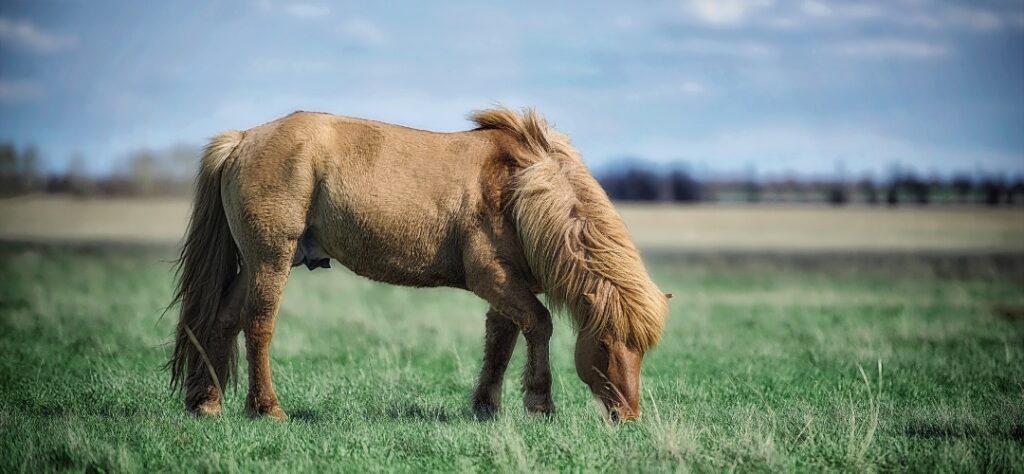Hay belly is a condition that commonly affects horses, particularly those that consume a diet predominantly based on forages such as hay or pasture. It refers to a distended abdomen, which gives the appearance of a swollen or bloated belly. While it may sound harmless, hay belly can actually indicate underlying health issues that require attention and proper management.
What is Hay Belly?
Hay belly, also known as grass belly or hay gut, occurs when a horse’s digestive system becomes disrupted or imbalanced. This condition is characterized by an enlargement of the abdomen, caused by an accumulation of gas and/or fluid. Upon visual examination, the horse’s belly appears rounded or convex, distinctively different from a healthy horse’s abdomen.
Hay belly is not only a cosmetic concern but can also have negative health implications for the horse. The distended abdomen can put pressure on the horse’s internal organs, potentially leading to discomfort and compromised organ function. Additionally, the accumulation of gas and fluid can cause colic, a painful condition that requires immediate veterinary attention.
Digestibility of Forages
Hay belly is most commonly seen in horses on a high-forage diet, especially those consuming low-quality hay or grazing on lush pastures. The condition is often linked to poor digestion and is more prevalent in horses that are unable to efficiently utilize the nutrients present in their diet.
In addition to the quality of forages, the horse’s own digestive system plays a role in digestibility. Horses have a large cecum and colon, which are responsible for fermenting and breaking down fiber. The microbial population in these parts of the digestive system also contributes to the digestibility of forages. A healthy and diverse microbial population can enhance the horse’s ability to extract nutrients from forages.
Low-quality forages, which are often fiber-rich but lacking in essential nutrients, are more difficult for horses to digest effectively. Consequently, their digestive system may struggle to break down large amounts of fiber, resulting in a build-up of gas and fluid in the gut, leading to hay belly.
When it comes to the digestibility of forages, several factors come into play. One of the key factors is the maturity of the plant material. As plants mature, their fiber content increases, while their nutrient content decreases. This means that mature forages are generally less digestible than younger, more tender ones.
Another important factor is the species of the forage. Different plant species have varying levels of digestibility. For example, legumes such as alfalfa and clover are generally more digestible than grasses. This is because legumes have a higher protein content and lower fiber content compared to grasses.
The processing and storage of forages can also affect their digestibility. For instance, hay that has been cut and dried properly retains more of its nutrient content and is easier for horses to digest. On the other hand, horses that are fed hay that is moldy, dusty, or nutritionally deficient may struggle to digest it properly. This can lead to fermentation in the gut, resulting in the production of excess gas and fluid. As a result, the horse’s abdomen becomes distended, giving it the characteristic hay belly appearance.
In addition to low-quality hay, horses grazing on lush pastures can also develop hay belly. Lush grass is high in sugar and can cause an imbalance in the horse’s digestive system. The excess sugar can disrupt the microbial population in the gut, leading to fermentation and gas production. This, in turn, contributes to the enlargement of the abdomen.
Distinguishing Between Hay Belly and Obesity
When it comes to equine health, it is crucial to differentiate between hay belly and obesity in horses. Although both conditions can lead to a swollen belly, they have distinct causes and implications that require careful consideration.
Obesity in horses is primarily a result of excessive calorie intake and a lack of physical activity. When horses consume more calories than they burn, their bodies store the excess energy as adipose tissue, commonly known as fat. This accumulation of fat can be observed in various parts of the horse’s body, such as the neck, tailhead, and ribs.
In obese horses, these areas may appear visibly enlarged and have a soft, spongy texture. In contrast, hay belly is characterized by a swollen abdomen while the rest of the horse’s body maintains a healthy weight. This condition is not directly related to excessive calorie intake but rather to the horse’s digestive system.
It is important to note that hay belly can affect horses of all sizes and breeds, regardless of their overall body condition. Even horses that appear thin or underweight can develop a hay belly if their digestive system is not functioning optimally. Conversely, horses with a healthy body weight can also experience hay belly if their diet is not properly balanced or if they have underlying digestive issues.
When assessing a horse’s condition, it is crucial to consider other factors beyond just the appearance of a swollen belly. Obese horses typically exhibit a generalized accumulation of fat throughout their body, whereas horses with hay belly will primarily display distention in the abdominal area. Additionally, obese horses may have difficulty performing physical activities and may show signs of exercise intolerance, while horses with hay belly may not exhibit any other related symptoms.
Proper diagnosis and treatment of these conditions require the expertise of a veterinarian. They will conduct a thorough examination, evaluate the horse’s overall body condition, and consider other potential underlying factors. In some cases, a veterinarian may recommend dietary adjustments, exercise plans, or even medical interventions to address the specific condition.
Health Implications of Hay Belly
Hay belly can have significant health implications for horses. The distension of the abdomen can compress the intestines, leading to reduced digestive function and discomfort. This can manifest as colic, decreased appetite, weight loss, and even nutrient deficiencies.
In some cases, hay belly may be a sign of an underlying health condition. Gastrointestinal upset, such as an imbalance in gut bacteria or inflammation of the intestinal lining, can contribute to the development of hay belly. Malabsorption syndromes, where the horse’s digestive system is unable to properly absorb nutrients from the food, can also lead to the distension of the abdomen. Additionally, certain types of parasites, such as tapeworms or large strongyles, can cause inflammation and blockages in the intestines, resulting in hay belly.
To address hay belly and its associated health implications, it is important for horse owners and caretakers to take a comprehensive approach. This includes evaluating the horse’s diet and ensuring they are receiving the appropriate amount and quality of forage. If necessary, a veterinarian or equine nutritionist can provide guidance on adjusting the horse’s diet to meet their specific needs.
Hay belly is not a condition to be taken lightly. It can have significant health implications for horses, ranging from reduced digestive function to nutrient deficiencies. By addressing the underlying causes and implementing appropriate management practices, horse owners and caretakers can help prevent and manage hay belly, ensuring the overall health and well-being of their equine companions.
Preventing and Managing Hay Belly
Preventing and managing hay belly involves several important considerations. First and foremost, it is crucial to provide horses with a balanced diet that meets their nutritional requirements. This includes offering high-quality hay or pasture, supplemented with appropriate concentrates, when necessary.
When a horse develops hay belly, it is often an indication of an imbalance in their diet or digestive system. One common cause is overfeeding of hay or poor quality forage. Horses that have access to unlimited amounts of hay may consume more than their digestive system can handle, leading to the distension of the abdomen.
Another factor that can contribute to hay belly is a lack of exercise. Horses that are not given regular opportunities to move and graze throughout the day may experience a slowdown in their digestive system. This can result in the accumulation of gas and food in the intestines, leading to the distended appearance of the abdomen.
Regular dental care is also essential. The horse’s teeth should be checked and floated periodically to ensure proper chewing and adequate breakdown of forage. This helps prevent the formation of large fiber masses in the digestive tract, which can contribute to hay belly. A horse with dental issues may not be able to effectively chew its food, leading to improper digestion and the development of hay belly.
To a balanced diet and dental care, proper hydration is crucial for preventing hay belly. Horses should have access to clean, fresh water at all times. Dehydration can lead to a sluggish digestive system, making horses more prone to developing hay belly. Horse owners should regularly check water sources and ensure that horses are drinking an adequate amount of water.
Additionally, implementing a scheduled deworming program and managing parasite control is vital. Internal parasites can compromise a horse’s digestive system and negatively affect its overall health. Regular fecal exams and appropriate deworming protocols can help minimize the risk of hay belly caused by parasitic infestations. It is important to work with a veterinarian to develop a deworming schedule that is tailored to the specific needs of each horse.
If hay belly persists despite dietary and exercise modifications, it is important to consult with a veterinarian. They can perform a thorough examination and diagnostic tests to determine if there are any underlying health conditions contributing to the issue. Treatment options may include medications to address gastrointestinal upset or parasite infestations, as well as further dietary adjustments.
Hay belly in horses is a condition that should not be overlooked. While it may initially seem like a cosmetic issue, it can have detrimental effects on a horse’s health and well-being. By understanding the causes and implications of hay belly, horse owners and caretakers can take proactive steps to prevent and manage this condition, ensuring the long-term health and happiness of their equine companions.


